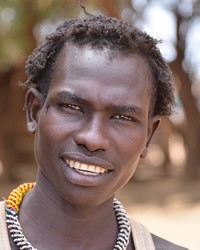Daasanach in South Sudan

Photo Source:
Rod Waddington - Wikimedia
Creative Commons
|
Send Joshua Project a map of this people group.
|
| People Name: | Daasanach |
| Country: | South Sudan |
| 10/40 Window: | No |
| Population: | 5,100 |
| World Population: | 117,100 |
| Primary Language: | Daasanach |
| Primary Religion: | Ethnic Religions |
| Christian Adherents: | 3.19 % |
| Evangelicals: | 1.21 % |
| Scripture: | New Testament |
| Ministry Resources: | Yes |
| Jesus Film: | Yes |
| Audio Recordings: | Yes |
| People Cluster: | Omotic |
| Affinity Bloc: | Horn of Africa Peoples |
| Progress Level: |
|
Introduction / History
The Daasanach are a people with a recent history. Their ties to one another have resulted from a common place of residence rather than from heredity. Exiles from many groups around the area of north Lake Turkana have united in support of one another in this hostile, arid environment. They have developed a unique tradition and culture and are open to the inclusion of other immigrants who are willing to abide by Daasanach customs and values.
Until the turn of the century, very little was known of the Daasanach, sometimes called the Merille. At that time, formal borders were created for many African countries, and the Daasanach found their traditional lands divided between South Sudan, Ethiopia and Kenya. Since then, these semi-nomadic people have moved as freely as possible across the borders of these countries, but this movement is being more and more restricted by border posts and entry formalities.
What Are Their Lives Like?
The Daasanach are known for their fighting prowess and are feared by many neighboring groups, such as the Gabbra and Turkana. Raids to obtain more cattle are celebrated, and Daasanach warriors are proud of the number of enemies they have killed. Their unique culture is valued, and the Daasanach are reluctant to adopt outside technology. Irrigation systems to aid in agriculture were introduced to this area by American missionaries in the 1960s, but these systems have been disregarded since foreigners were expelled from Ethiopia after the overthrow of Emperor Haile Selassie in 1974.
What Are Their Beliefs?
Today church work is being carried out in Kenya where only ten percent of the Daasanach people live. In South Sudan there are very few Daasanach Christians. What is left of earlier church work in Ethiopia is unknown.
The Daasanach people depend on the same spirit world that they have embraced for many generations. In South Sudan, they remain entrapped by this spirit world, with no way out except by the cross. Who will show them the way to spiritual freedom?
What Are Their Needs?
The Daasanach people need loving Christian workers and the spiritual discernment to choose Jesus Christ.
Prayer Points
Pray for the Daasanach people to put their faith in Jesus Christ rather than their traditional gods. Pray for the Lord to protect and guide workers among the Daasanach people. Pray for a movement to Christ to flourish. Pray for Bible translation work to bear good fruit among the Daasanach people.